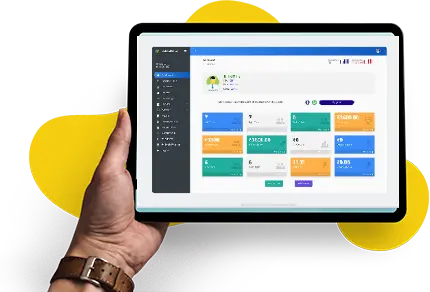Imagine this: it's payday for your MLM distributors. But instead of celebratory cheers, there's a chorus of groans and angry emails. Commissions are wrong, payouts are late, and the frustrations are running high. Sound familiar?
For many MLM businesses, commission management becomes a tangled mess that strangles growth faster than you can say "upline." But what if it didn't have to be this way?
In this comprehensive guide, we will explore the key components of efficient commission management in network marketing. From understanding the benefits to dealing with the challenges of MLM commission calculation, this blog will equip you with the knowledge to optimize your commission structures and drive your MLM business forward.
This Article Contains:
What is MLM Commission Management?
MLM Commission Management refers to the systems and processes used to calculate, distribute and track payments to distributors within an MLM organization. These commissions are typically based on a variety of factors, including individual sales, team sales and overall network performance.
Here is an example:
Consider a health and wellness MLM company that sells nutritional supplements. The company uses an MLM commission management system to:
Calculate commissions based on individual distributor sales, with higher percentages for higher sales volumes.
Track team sales to reward leaders who help their downline members achieve sales targets.
Monitor overall network performance to allocate bonuses for top performers across the organization.
For instance, Distributor A sells $1,000 worth of products in a month, earning a 10% commission, or $100. Distributor A's team collectively sells $5,000, qualifying Distributor A for an additional team commission of 5%, or $250. Additionally, because the entire network achieves a sales milestone, Distributor A receives a performance bonus of $500.
Effective commission management in this scenario ensures Distributor A remains motivated, all earnings are accurately tracked and distributed, and the company complies with relevant financial regulations, thus driving overall business success.
Key Components of MLM Commission Management
The key components of MLM Commission Management are:
-
Commission Structures:
Defining clear and motivating commission structures that reward both individual and team efforts. This may involve direct sales commissions, bonuses for achieving certain targets, and residual income from the sales of recruited team members.
-
Accurate Tracking and Calculation:
Implementing robust systems to accurately track sales activities and calculate commissions based on predefined criteria. This involves using software tools and technologies that can handle the complexities of MLM commission calculations.
-
Timely Payments:
Ensuring that commissions are paid out accurately and on time to maintain distributor trust and motivation. Timely payments are crucial for sustaining a positive relationship with your sales force.
-
Compliance and Transparency:
Adhering to legal and regulatory requirements related to MLM compensation plans. Transparency in commission calculations and payments helps build trust with distributors and avoids potential legal issues.
-
Reporting and Analytics:
Utilizing reporting tools to monitor commission payouts, sales performance and distributor activities. Analytics can help identify trends, optimize commission structures and make data driven decisions to enhance business performance.
Different Types of MLM Commission Structure and Bonus
MLM organizations use a variety of MLM Commission structure and bonus to incentivize and reward their distributors. Here are some of the most common types:
1. Unilevel
In a Unilevel commission structure, each distributor recruits their own team, and all recruits are placed directly under them, forming a single level. Distributors earn commissions based on the sales of their direct recruits and sometimes through the sales of the distributors of their immediate recruits, typically extending a few levels deep.
2. Binary
The Binary commission structure requires each distributor to recruit and place new members into two legs, often referred to as the left and right legs. Commissions are paid based on the sales volume of the weaker leg, encouraging distributors to balance their teams and foster growth in both legs.
3. Matrix
The Matrix structure sets a fixed width and depth, such as 3x3 (three recruits wide and three levels deep). Once a distributor fills their matrix, excess recruits spill over to the next available spot, benefiting their upline and downline. This system encourages teamwork and helps distributors benefit from their sponsor's recruiting efforts.
4. Stair Step Breakaway
In the Stair Step Breakaway structure, distributors advance through ranks based on their sales volume and their team's performance. Once a distributor reaches a certain rank, they "break away" from their upline and form their own unit. Commissions are earned from both personal sales and the performance of their breakaway team.
5. Sponsor Bonus
The Sponsor Bonus rewards distributors for personally sponsoring new recruits. This bonus is typically a percentage of the initial sales or signup fee generated by the new recruit. It incentivizes active recruiting and expands the network.
6. Personal Sales Commissions
Personal Sales Commissions are earnings based on a distributor's direct sales to customers. This type of commission encourages distributors to focus on retail sales and generate immediate income through their own efforts.
7. Downline Commissions
Downline Commissions are earned from the sales generated by a distributor's recruits and their recruits' teams. This creates a residual income stream as distributors benefit from the sales activities of their entire downline organization.
8. Leadership Bonus
Leadership Bonus rewards top-performing distributors who achieve high ranks or meet specific performance criteria. These bonuses often come in the form of additional percentages on group sales or special cash rewards, recognizing and incentivizing leadership and excellence.
9. Rank Advancement Bonus
Rank Advancement Bonuses are awarded to distributors when they achieve new ranks within the MLM hierarchy. These bonuses serve as milestones, encouraging distributors to reach higher levels of performance and leadership within the organization.
10. Roll Up Bonus
The Roll Up Bonus occurs when a distributor leaves the MLM or fails to meet certain criteria, and their downline is reassigned to their upline. This bonus allows the upline to receive commissions from the sales of the reassigned downline, ensuring that the network's structure remains profitable and rewarding for active members.
11. Volume Bonus
A bonus based on achieving certain sales volume thresholds, either individually or as a team. This encourages distributors to increase their overall sales efforts.
12. Overrides
Overrides are a form of residual income earned by higher ranking distributors from the sales made by their downline, extending several levels deep. Overrides are designed to reward distributors for building and supporting a successful team.
What are the Factors Influencing MLM Commission Structure?
The design of MLM Commission structures in Multi-Level Marketing organizations is influenced by a variety of factors. Understanding these elements is crucial for creating a balanced and effective compensation plan that motivates distributors and supports the overall business strategy. Here are the key factors that influence MLM Commission structure:
1. Product Pricing
The pricing of products directly affects the commission structure. Higher-priced products may allow for larger commissions per sale, while lower-priced items might require higher sales volumes to achieve similar earnings. The pricing strategy must align with the target market and ensure that distributors can earn a competitive income.
2. Product Margins
Product margins, or the difference between the cost of production and the selling price, determine how much revenue is available for commission payouts. Higher margins provide more flexibility in creating attractive commission plans, while lower margins might limit the potential earnings for distributors.
3. Compensation Plan Complexity
The complexity of the compensation plan can impact distributor motivation and retention. Simple plans are easier to understand and explain to potential recruits, while more complex plans may offer greater rewards but require more effort to comprehend. Balancing simplicity with attractive incentives is crucial.
4. Recruitment vs. Sales Emphasis
The focus on recruitment versus direct sales heavily influences how commissions are structured. The plans that prioritize recruitment, distributors can earn generous bonuses and higher commissions for bringing in new members. On the other hand, plans centered around sales reward distributors mainly based on their team's sales achievements.
5. Performance Incentives
Incorporating performance incentives, such as bonuses for achieving sales targets or rank advancements, can significantly influence distributor behavior. These incentives drive both short-term sales efforts and long-term commitment to the MLM business.
6. Minimum Sales Requirements
Setting minimum sales requirements for earning commissions ensures that distributors remain active and contribute to the overall sales volume. These requirements help maintain a steady flow of sales and discourage inactive members from benefiting from the compensation plan without contributing.
7. Profit Sharing and Bonuses
Profit sharing and additional bonuses, such as leadership bonuses or profit pools, can make the commission structure more appealing. These rewards recognize and compensate top performers, fostering loyalty and encouraging distributors to strive for higher achievements.
8. Market Competition
The level of competition in the market influences how generous and competitive the commission structure needs to be. In highly competitive markets, MLM companies may need to offer more attractive compensation plans to attract and retain top talent.
9. Legal and Regulatory Compliance
Compliance with legal and regulatory standards is critical when designing commission structures. MLM companies must ensure their plans meet the requirements set by regulatory bodies to avoid legal issues and maintain credibility. This includes avoiding pyramid scheme characteristics and ensuring fair compensation practices.
10. Company Culture and Values
The culture and values of the MLM company play a significant role in shaping the commission structure. Companies that prioritize ethical practices, distributor welfare and long-term relationships will design compensation plans that reflect these values, fostering trust and loyalty among their network.
What are the Benefits of Commission Management in MLM?
Effective Commission management is a cornerstone of success in Multi-Level Marketing. Here are the key benefits of implementing commission management in MLM. They are:
1. Motivates Distributors
A well designed commission management system provides clear and attainable incentives for distributors. By offering attractive commissions and bonuses, distributors are motivated to increase their sales efforts and recruit new members, driving overall business growth.
2. Encourages Growth
Solid commission management structures promote both personal and team growth. Distributors are incentivized to build and support their downlines, creating a ripple effect that expands the network. This focus on growth helps the MLM organization scale and reach new markets.
Want to learn more about how to be successful in MLM business, Consider reading our blog,MLM Tips for achieving success in MLM business.
3. Improves Retention
Retention of distributors is crucial for the long-term success of an MLM business. Effective commission management ensures that distributors are fairly compensated for their efforts, fostering loyalty and reducing turnover rates. Happy and well compensated distributors are more likely to stay committed to the organization.
4. Enhances Accountability
Transparent and accurate commission management systems enhance accountability within the MLM network. Distributors can track their earnings and understand how their efforts translate into commissions. This clarity helps maintain trust and encourages consistent performance.
5. Streamlines Operations
Automated and efficient commission management systems streamline administrative tasks, reducing the burden on the company's operations team. By minimizing errors and ensuring timely payments, these systems improve overall operational efficiency and allow the company to focus on strategic initiatives.
6. Facilitates Growth Strategies
A robust commission management system supports the implementation of growth strategies by aligning incentives with business objectives. Whether the focus is on expanding the distributor base or increasing sales volumes, well-managed commissions can drive the desired outcomes and support the company's strategic goals.
7. Promotes Trust and Transparency
Trust and transparency are vital in MLM relationships. Effective commission management ensures that calculations and payments are transparent and fair. This transparency builds trust among distributors, creating a positive and collaborative network culture.
Best 10 Practices for MLM Commission Management
Managing commissions effectively is essential for the success of Multi-Level Marketing organizations. Here are some best practices for efficient and transparent commission management:

1. Define Clear and Fair Compensation Plans
Establish transparent compensation plans that clearly outline commission structures, bonuses, and qualification criteria. Ensure that the plans are fair and motivating for distributors, aligning with the company's goals and values.
2. Automate Commission Calculation
Utilize MLM commission management software to automate commission calculations. This reduces errors, saves time, and ensures accuracy in payouts. Automated systems can handle complex calculations and streamline the entire process.
3. Provide Real Time Reporting and Insights
It is very important that the distributors in your MLM company have access to real-time reporting and performance insights. This allows them to track their progress, understand their earnings, and identify areas for improvement. Transparency in reporting builds trust and motivates distributors.
4. Communicate Effectively
Maintain open and clear communication channels with distributors regarding commission calculations, payout schedules, and performance expectations. Address any questions or concerns promptly to avoid misunderstandings and build trust.
5. Ensure Compliance with Regulations
Stay updated on legal and regulatory requirements related to MLM compensation plans. Ensure that your commission structures comply with applicable laws and regulations to avoid legal issues and maintain credibility.
6. Implement Performance Incentives
Incorporate performance-based incentives to motivate distributors to achieve specific sales targets and goals. Reward top performers with bonuses, recognition, or other incentives to encourage consistent performance and drive growth.
7. Regularly Review and Adjust Commission Structures
Periodically review your commission structures to ensure they remain competitive and aligned with your business objectives. Adjustments may be necessary based on market trends, distributor feedback or changes in company strategy.
8. Foster a Positive Company Culture
Promote a culture of fairness, transparency, and collaboration within your MLM organization. Encourage teamwork, recognize achievements, and provide support to distributors to enhance morale and retention.
9. Invest in Training and Support
Offer comprehensive training programs and ongoing support to help distributors succeed. Equip them with the knowledge, tools, and resources they need to effectively promote products, build their teams, and maximize their earnings.
10. Continuously Improve Processes
Regularly evaluate and optimize your commission management processes to identify areas for improvement. Solicit feedback from distributors and stakeholders to identify pain points and implement solutions that enhance efficiency and effectiveness.
What are the Common Challenges Faced During MLM Commission Management?
Managing commissions in Multi-Level Marketing can be complex and challenging. Here are some of the common challenges faced during MLM commission management:
1. Data Inconsistencies and Errors
Accurate data is crucial for calculating commissions, but inconsistencies and errors can occur due to various reasons, such as manual data entry, integration issues between systems, or incorrect reporting by distributors. These discrepancies can lead to incorrect payouts, resulting in dissatisfaction and loss of trust among distributors.
2. Complex Commission Structures
MLM compensation plans often involve multiple levels, various types of commissions, and different bonus structures. Managing these complex commission structures requires sophisticated systems and detailed understanding. Without proper tools and expertise, it can be difficult to ensure accurate and timely payouts.
3. Communication Issues & Lack of Transparency
Effective communication and transparency are essential for maintaining trust and motivation within the MLM network. However, poor communication regarding commission calculations, payout schedules, and performance metrics can lead to confusion and frustration among distributors. Lack of transparency can result in suspicions of unfair practices and decrease distributor morale.
4. Scalability Issues
As an MLM organization grows, managing commissions for a large and expanding network becomes increasingly challenging. Scalability issues can arise from inadequate systems that cannot handle the volume of data and transactions, leading to delays and errors in commission processing. Ensuring that the commission management system can scale with the business is critical for sustaining growth.
What are the Challenges faced when Managing MLM Commissions within MLM Organizations?
Effective MLM commission management software is designed to address the common challenges faced in managing MLM commissions within Multi-Level Marketing organizations. Here’s how this software tackles these challenges:
1. Automation of Commissions
Challenge: Manual calculations are error-prone and time-consuming, leading to inaccuracies and inefficiencies.
Solution: MLM commission management software automates the entire process of commission calculation and distribution. This ensures accuracy, reduces human errors and saves significant time. Automated systems can handle complex calculations swiftly and consistently, providing reliable payouts to distributors.
Find out more about how automation tools are changing the MLM landscape. Consider reading our blog, Top Network Marketing Automation Tools.
2. Customized Compensation Plans
Challenge: Managing multiple commission structures and bonuses is complex and requires detailed oversight.
Solution: The software allows for the creation and management of customized compensation plans that can cater to various levels, types of commissions, and bonuses. This flexibility ensures that the compensation plans align with the company's strategic goals and distributor needs, facilitating more effective incentive programs.
3. Real Time Reporting
Challenge: Lack of timely information and insights can lead to poor decision-making and dissatisfaction among distributors.
Solution: MLM commission management software provides real-time reporting and analytics. Distributors and administrators can access up-to-date information on sales, commissions, and performance metrics. This transparency helps in making informed decisions and keeps distributors motivated by allowing them to track their progress.
4. Scalability
Challenge: As the network grows, managing an increasing number of distributors and transactions becomes more difficult.
Solution: The software is designed to scale with the business, accommodating a growing number of users and larger volumes of data. This scalability ensures that the system remains efficient and effective as the MLM organization expands, preventing delays and errors in commission processing.
5. Compliance Management
Challenge: Ensuring compliance with legal and regulatory standards is crucial to avoid legal issues and maintain credibility.
Solution: MLM commission management software incorporates compliance management features that ensure compensation plans adhere to regulatory requirements. The software can automatically update based on new regulations, helping to prevent legal issues and ensuring fair practices.
6. Enhanced Communication
Challenge: Poor communication and lack of transparency can lead to confusion and mistrust among distributors.
Solution: The software enhances communication by providing clear, accessible information on commission calculations, payout schedules, and performance metrics. Distributors can easily understand how their commissions are calculated, fostering trust and reducing misunderstandings.
7. Centralized Data Management
Challenge: Data inconsistencies and errors often arise from disparate and unintegrated systems.
Solution: MLM commission management software centralizes all data related to sales, commissions, and distributor performance. This centralization ensures data consistency and accuracy, making it easier to manage and reconcile information across the organization.
8. Improved Distributor Retention
Challenge: High distributor turnover can hinder growth and stability within the MLM network.
Solution: By ensuring timely and accurate commission payouts, offering clear performance insights, and providing fair and motivating compensation plans, the software helps improve distributor satisfaction and retention. Happy distributors are more likely to stay committed to the organization.
9. Integration with Other Systems
Challenge: MLM organizations often use various systems for different functions, leading to integration challenges.
Solution: The software can integrate with other systems such as CRM, ERP, and e-commerce platforms. This integration ensures seamless data flow and consistency across different functions, improving overall operational efficiency and enabling more comprehensive insights.
10. Cost Effectiveness
Challenge: Managing commissions manually or through inefficient systems can be costly and resource intensive.
Solution: MLM commission management software reduces costs associated with manual processing, errors, and administrative overhead. By automating complex calculations and streamlining operations, the software decreases the need for extensive manpower and reduces the risk of costly mistakes. This cost-effectiveness allows the organization to allocate resources more efficiently, enhancing overall profitability.
Conclusion
It is crucial for any MLM company to effectively manage MLM commissions. By effectively managing your network marketing commissions, you empower your distributors with clear goals, foster trust through transparency, and fuel their motivation with timely rewards.
To help with your MLM Commission plan, consider using Global MLM Commission Software. With its advanced features, seamless integration, scalability and compliance management, MLM Commission Software from Global MLM offers unparalleled benefits.
FAQs
1. Why is MLM Commission Management important in MLM business?
MLM Commission management is essential for maintaining distributor motivation, ensuring compliance with legal and regulatory requirements, and driving the overall success of the MLM business. It helps foster trust, transparency and accountability within the network.
2. How do MLM businesses handle Commission disputes or discrepancies effectively?
MLM businesses handle Commission disputes or discrepancies by establishing clear policies, prompt communication channels, and thorough investigation processes. They maintain transparency throughout the resolution process. Open dialogue with distributors, ongoing training, and continuous improvement efforts are prioritized to prevent future disputes. If needed, there's usually an escalation resolution process in place.







Comments
Leave a Reply
Your email address will not be published. Required fields are marked *